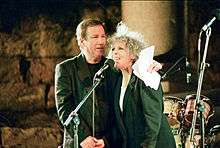Ehud Manor
| Ehud Manor | |
|---|---|
 Manor with his wife Ofra Fuchs | |
| Born |
Ehud Weiner July 13, 1941 Binyamina, Mandatory Palestine (now Israel) |
| Died | April 12, 2005 (aged 63) |
| Citizenship | Israeli |
| Occupation | Songwriter, translator, and radio and TV personality |
| Awards | 1998 Israel Prize |
Ehud Manor (Hebrew: אהוד מנור; born Ehud Weiner; July 13, 1941 – April 12, 2005) was an Israeli songwriter, translator, and radio and TV personality.
Biography
Ehud Weiner (later Manor) was born in Binyamina. He had two brothers, Zvi and Yehuda. He was married to actress Ofra Fuchs for 40 years; together, they had three children: Gali, Libby and Yehuda (Yadi), who was named after Manor's late brother.,[1] a fallen soldier in War of Attrition in 1968. Ehud's other brother, Ze'ev, committed suicide in 2003 as a result of financial trouble.
Ehud Manor, who had been a heavy smoker earlier in his life, was diagnosed with lung cancer in the early 2000s. Although he recovered, the cancer treatment weakened his heart, and he died suddenly on April 12, 2005, aged 63, of cardiac arrest.
Music and songwriting career
Ehud Manor began working for Israel radio in the 1960s as a musical editor. He changed his surname to Manor as it was customary at the time for radio announcers to adopt Hebrew names.[1]
During his career, he wrote over 1,250 Hebrew songs, including "Ein Li Eretz Acheret" (I Have No Other Country), "Brit Olam" (World Covenant), "BaShanah HaBa'ah" (Next Year) which became an international standard, "Zo Yalduti HaShniya" (This Is My Second Childhood), and "Ahi HaTza'ir Yehuda" (My Younger Brother Yehuda). The latter was written in memory of his brother, who was killed during his military service in 1968.[2]
He wrote the lyrics to several Israeli Eurovision Song Contest entries, including the 1978 winner "Abanibi", the 1975 entry "At Ve'Ani (You and Me)" with its singer Shlomo Artzi, the 1983 entry "Khay" (Alive), the 1992 song "Ze Rak Sport" (It's Just Sports), the 2004 entry, "Leha'amin" ("To Believe"; which he co-wrote with David D'Or).[3]
Literary career
Also a successful translator, Manor translated more than 600 works into Hebrew, including such Broadway hits as Cabaret and Les Misérables. In addition, he translated Barney songs into Hebrew for the Israeli coproduction "Hachaverim Shel Barney".[4]
Awards and recognition
In 1998, Manor was awarded the Israel Prize for Hebrew song.[5] The prize committee noted that "For the past 30 years, he has expressed our mood through the hundreds of songs he has written together with the finest composers. The man who declared that he had no other country is the laureate of the Israel Prize."[6]
Shortly before he died, Manor was chosen to receive an honorary doctorate from Bar-Ilan University in recognition of his prolific activity in the field of Hebrew music.[6]
Manor's songs are the most played on Israeli radio.[6]
See also
References
- 1 2 "Ehud Manor 1941–2005".
- ↑ Obituary: Ehud Manor – Leading Israeli songwriter behind Eurovision win accessed August 4, 2010
- ↑ Nili Design (December 22, 2009). "David Deor – Discography- LeHaamin – To Believe". Daviddor.com. Retrieved August 31, 2011.
- ↑ Zacharia, Janine (December 25, 1997) [1997], "Why Barney Doesn't Wear a Yarmulke", The Jerusalem Report
- ↑ "Israel Prize Official Site – Recipients in 1998 (in Hebrew)".
- 1 2 3 Palti, Michal. "Ehud Manor, 1941-2005". Haaretz. Retrieved August 31, 2011.